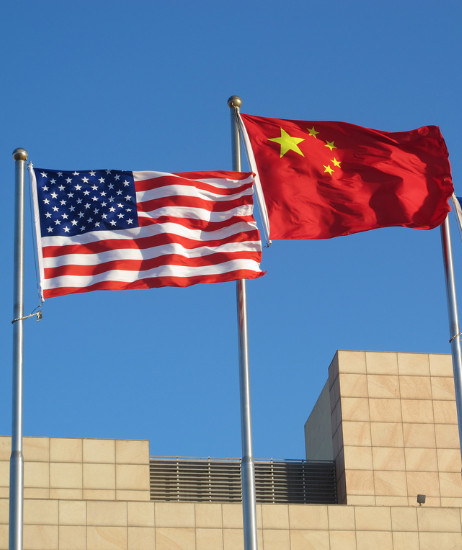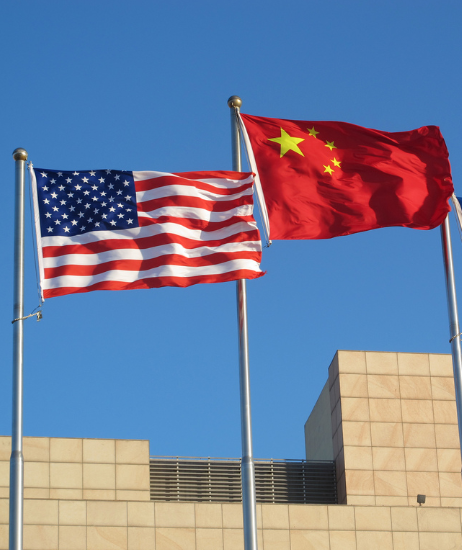
CDC via flickr
According to the report of Moody's agency published on Tuesday, the tension in US-China trade relations is likely to continue to grow in the second half of the year and will have a negative, though amenable, impact on economic growth. "We expect that the trade conflict between the US and China, as well as other countries, will continue, and further measures in this area will be put into effect in the remaining period of 2018." Now we believe that the trade conflict will not stop until the full implementation of the most severe potential measures discussed so far, including tariffs for all car imports to the US or the disintegration of NAFTA, "says the report.
The paper contains three main conclusions. The first is that the agency sees the escalation of tension is as a base scenario, and expects continuation of the trade conflict and new measures on both sides. The second conclusion is that the trade conflict will become a deterrent to the growth of the world economy. In addition, according to analysts, it will have significant consequences for some industries and regions: industries that are protected by import restrictions will benefit, and industries using expensive imported or local resources will suffer. The shift of production chains will be costly, Asia will suffer the most. Companies that use the global supply chain are likely to temporarily reduce investment because of the uncertainty about what other measures will be taken in the context of the trade war. All this can lead to price changes, a decrease in efficiency and a decrease in consumer confidence, which will negatively affect the economy.
In July, both the US and China have already imposed 25 percent import duties on many goods, accounting for 2 percent of US imports and 3 percent of Chinese imports. With regard to specific dates in the future, in September-October, the United States is likely to introduce a 10-percent tariff for all Chinese imports to the country, which is estimated at $ 200 billion. China, in turn, will react to this by raising tariffs and other measures. In general, in the second half of the year, the US can introduce additional import duties on all imported cars, and may also impose restrictions on Chinese investments in technology that have already been discussed. In 2019, NAFTA conditions may be revised.
According to Moody`s analysts, although the trade war will have a negative impact on the US economy, this influence will be overcome as a whole, and the economy will grow (GDP growth in 2019 will reach 2,3%. As for the impact on the Chinese economy, the trade conflict will reduce GDP growth by 0.3-0.5%, and this may be offset by fiscal and political indulgences on the part of the Chinese authorities; the GDP in 2019 could grow by 6.4%.
The introduction of US duties on steel and aluminum will positively affect the relevant sectors, but will damage production. The impact on the European metallurgical industry will be negative, as some countries have already redirected the supply of cheap steel to the European market instead of the American one. The increase in tariffs for imports of any cars in the US will have a significant negative impact on European and Japanese manufacturers who do not have factories in the US, and will also complicate the work of car-related sectors in the US. The impact on Mexico - local plants will be especially strong( in 2017 they produced 3.7 million cars, with 82% of them were exported). Another country, which can increase the tariff increase, is Germany. It is the largest exporter of cars in the world, with exports to the United States in the first place, accounting for about 1% of German GDP. Interestingly, Chinese automakers will not feel any negative effect from US tariffs, as they export cars mainly to emerging markets.
source: moodys.com
The paper contains three main conclusions. The first is that the agency sees the escalation of tension is as a base scenario, and expects continuation of the trade conflict and new measures on both sides. The second conclusion is that the trade conflict will become a deterrent to the growth of the world economy. In addition, according to analysts, it will have significant consequences for some industries and regions: industries that are protected by import restrictions will benefit, and industries using expensive imported or local resources will suffer. The shift of production chains will be costly, Asia will suffer the most. Companies that use the global supply chain are likely to temporarily reduce investment because of the uncertainty about what other measures will be taken in the context of the trade war. All this can lead to price changes, a decrease in efficiency and a decrease in consumer confidence, which will negatively affect the economy.
In July, both the US and China have already imposed 25 percent import duties on many goods, accounting for 2 percent of US imports and 3 percent of Chinese imports. With regard to specific dates in the future, in September-October, the United States is likely to introduce a 10-percent tariff for all Chinese imports to the country, which is estimated at $ 200 billion. China, in turn, will react to this by raising tariffs and other measures. In general, in the second half of the year, the US can introduce additional import duties on all imported cars, and may also impose restrictions on Chinese investments in technology that have already been discussed. In 2019, NAFTA conditions may be revised.
According to Moody`s analysts, although the trade war will have a negative impact on the US economy, this influence will be overcome as a whole, and the economy will grow (GDP growth in 2019 will reach 2,3%. As for the impact on the Chinese economy, the trade conflict will reduce GDP growth by 0.3-0.5%, and this may be offset by fiscal and political indulgences on the part of the Chinese authorities; the GDP in 2019 could grow by 6.4%.
The introduction of US duties on steel and aluminum will positively affect the relevant sectors, but will damage production. The impact on the European metallurgical industry will be negative, as some countries have already redirected the supply of cheap steel to the European market instead of the American one. The increase in tariffs for imports of any cars in the US will have a significant negative impact on European and Japanese manufacturers who do not have factories in the US, and will also complicate the work of car-related sectors in the US. The impact on Mexico - local plants will be especially strong( in 2017 they produced 3.7 million cars, with 82% of them were exported). Another country, which can increase the tariff increase, is Germany. It is the largest exporter of cars in the world, with exports to the United States in the first place, accounting for about 1% of German GDP. Interestingly, Chinese automakers will not feel any negative effect from US tariffs, as they export cars mainly to emerging markets.
source: moodys.com


















